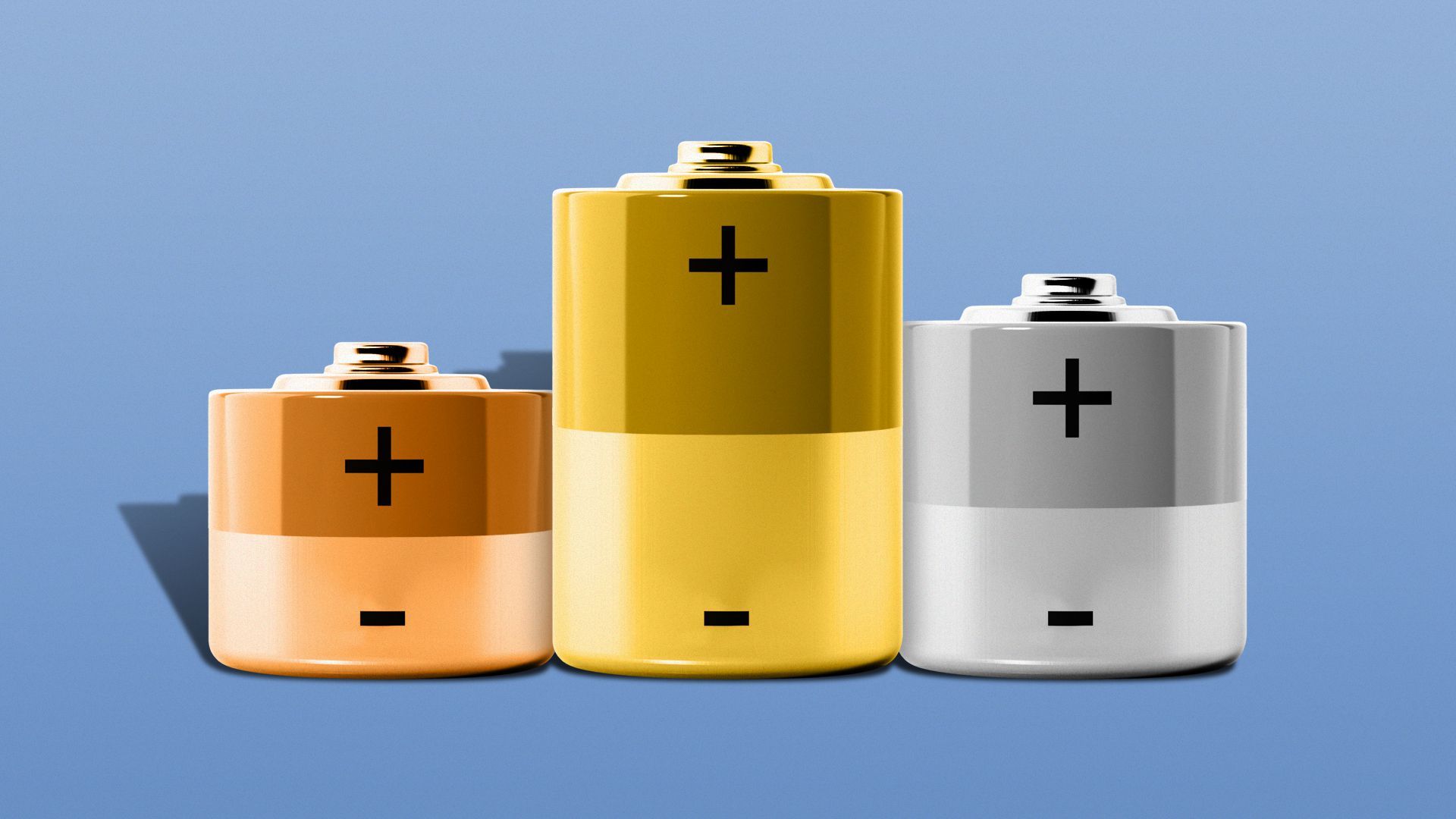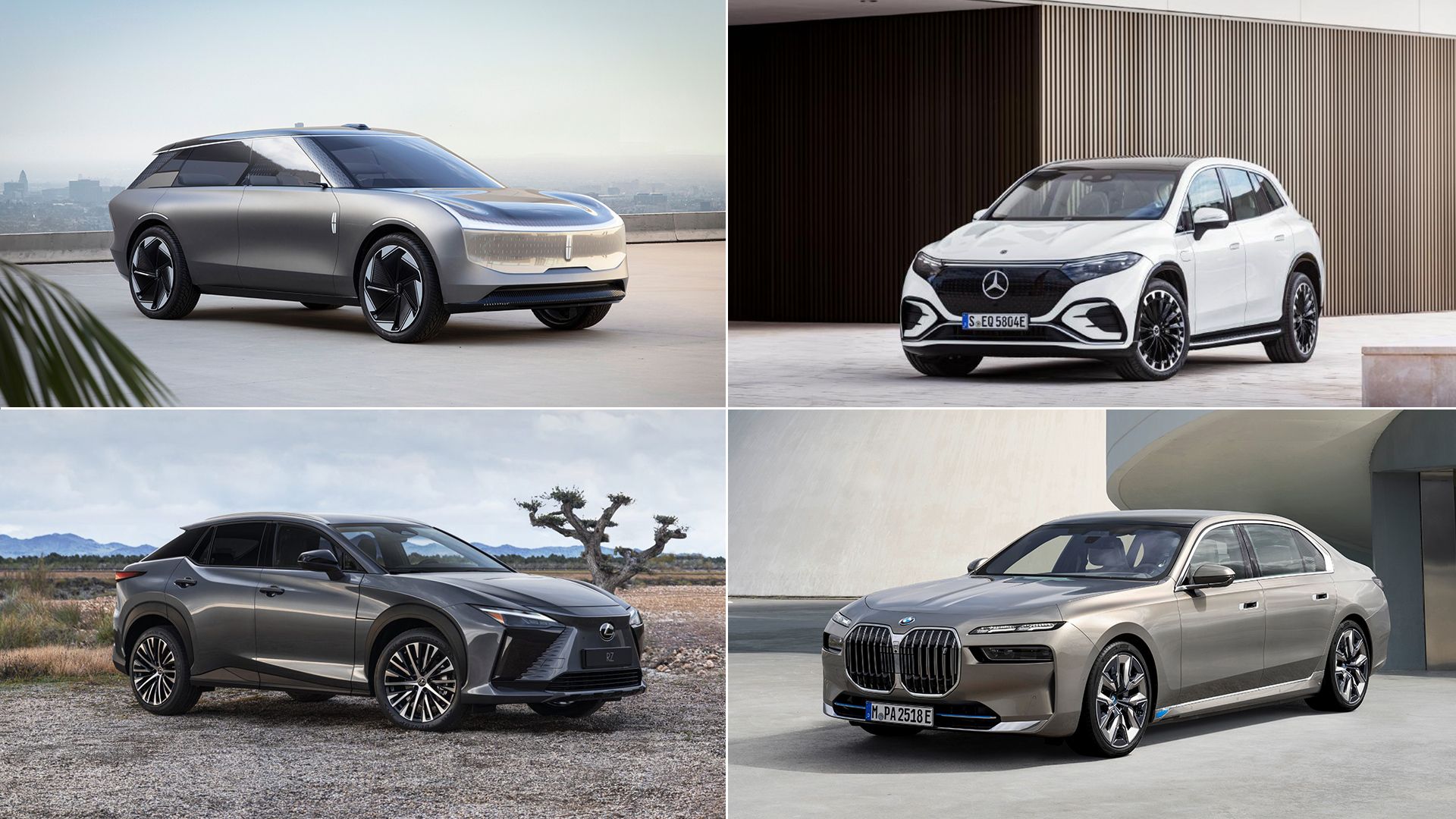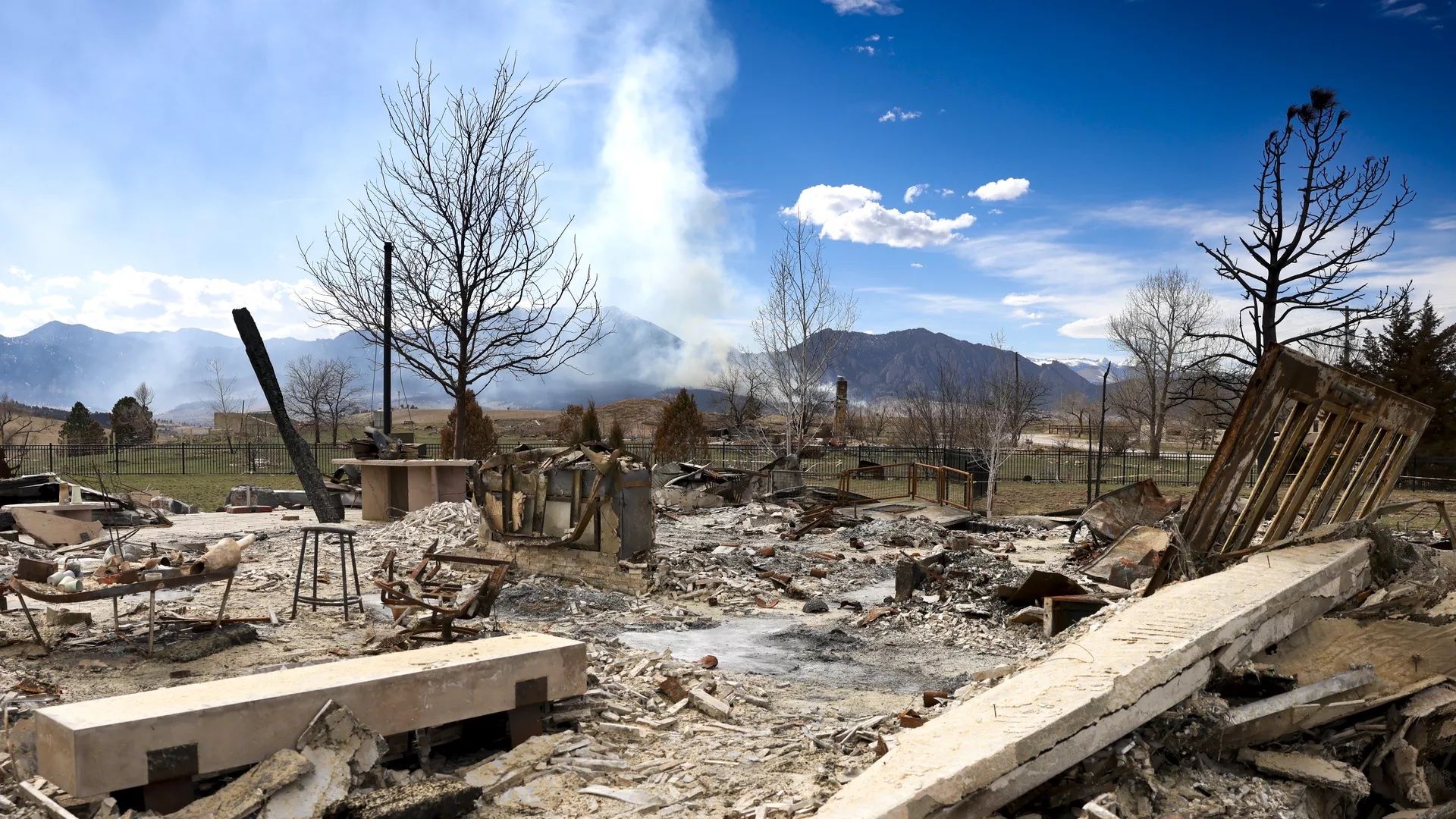| | | | | | | Presented By National Grid | | | | Axios What's Next | | By Jennifer A. Kingson and Joann Muller · Apr 21, 2022 | | In the market for an electric car? A bunch of new models debuted this week — and they're all gunning for Tesla. - Reach out if you see something cool or interesting about the way we'll live, work or get around. Email us at whatsnext@axios.com.
📨 Join Axios' Mike Allen and Ben Geman tomorrow at 12:30 p.m. ET for a virtual event examining the top priorities on the U.S. climate agenda and progress toward net-zero and clean energy goals. - Guests include White House national climate adviser Gina McCarthy and Center for Climate and Energy Solutions president Nat Keohane. Register here.
Today's Smart Brevity count: 1,163 words ... 4½ minutes. | | | | | | 1 big thing: Race to build a domestic battery industry |  | | | Illustration: Megan Robinson/Axios | | | | Batteries are the new oil — and the U.S. is lagging behind Europe and China in the race to make them. Why it matters: The historic shift to electric vehicles will give the U.S. a fresh chance to achieve energy independence, but it will require complex strategic moves that won't pay off for years. The big picture: Most of today's advanced batteries — not only to power cars and consumer electronics but also to store clean energy — are sourced in Asia. - Demand for batteries will skyrocket over the coming decades. If the U.S. wants to control its own energy destiny, it'll need a secure, resilient supply chain for critical minerals and other components.
- "If we don't do this, if we don't as a country invest in our supply chain, it will go to the lowest-cost country, which is China," says Michael O'Kronley, CEO of Ascend Elements, a battery recycling company.
By the numbers: President Biden wants half of all vehicles sold in the U.S. to be electric by 2030. But the U.S. has only about 5% of the manufacturing capacity needed to hit that target, Jigar Shah, head of the Energy Department's Loan Programs Office, told Reuters. - At the same time, other countries are setting equally aggressive EV goals — driving up prices for lithium, nickel and other materials.
Where it stands: The federal government is taking some of the necessary early steps to build a domestic battery industry, but experts say there are still some big gaps in that infrastructure. - Last month, Biden invoked the Cold War-era Defense Production Act to encourage domestic mining, processing and recycling of critical minerals — such as lithium, nickel, cobalt, graphite and manganese — that are required for EVs and clean-energy storage systems.
- And the government has given foreign companies incentives to build up refining and manufacturing capacity in the U.S.
- Meanwhile, carmakers are scrambling to build their own battery plants to guarantee supplies for their upcoming EVs.
Yes, but: There's still a gaping hole in America's efforts, said J.B. Straubel, a Tesla co-founder who is now the CEO of a battery component company called Redwood Materials. - Even with more battery plants in the U.S. and more minerals extracted from U.S. soil, the two most essential and expensive components of lithium-ion batteries — cathodes and anodes — are still produced almost entirely in China.
What they're saying: "If the U.S. does not connect every link in the supply chain from mine to battery cell, then its EV ambitions could fall apart," Moores said. What to watch: Over the next decade, Morgan Stanley analysts forecast the "balkanization" of the battery industry as governments and regions race to establish their own secure supplies of battery manufacturing capacity and key raw materials. Read the full story. |     | | | | | | 2. Wearables can track COVID symptoms |  | | | Illustration: Allie Carl/Axios | | | | Wearables like smartwatches can track the progression of COVID and even show how sick a person is through their heart rate, according to a new study in Cell Reports Medicine. Why it matters: The study offers further evidence of the potential health care value of consumer-grade wearables, per Axios Vitals. Details: The study, led by University of Michigan researchers, relied on data from more than 2,000 Fitbits given out to the school's undergrads and to thousands of medical interns around the U.S. - Researchers specifically looked at heart rate, which most wearable trackers measure, and separated it into six different signals that could indicate physiological changes in the wearer, said researcher Daniel Forger, a professor of mathematics.
- After identifying those who were diagnosed with COVID, they used changes in the individuals' heart rate data to develop algorithms to detect COVID infections.
Yes, but: There are still some clear limitations to consumers trying to garner health information from their wearables, as KHN reports today. What they're saying: This is just an example of the "remarkable" untapped value of the minute-by-minute data being gathered at scale through consumer-grade wearable devices, Forger told Axios. - "This points to a middle ground here. We are not at the point with our algorithms where we could detect COVID or diagnose someone better than with gold standard medical devices," he said.
- "But our point is this data exists on millions of people that could be easily detected when medical devices are scarce," he said.
|     | | | | | | 3. Tesla is getting more luxury EV competition |  | | | Clockwise, from top left: Lincoln Star, Mercedes EQS SUV, BMW i7 xDrive60, Lexus RZ 450e. Photos courtesy of the automakers | | | | Tesla is on a roll, as Wednesday's strong first-quarter financial results showed. But a bevy of new electric vehicles debuted this week from luxury manufacturers, all hungry to take a bite out of the EV leader. Lexus introduced its first battery-electric model, the RZ 450e, signaling a wave of Lexus EVs on the way. BMW rolled out its next-generation 7-series flagship, including the first fully electric version, the i7 xDrive60. Mercedes added to its growing EV portfolio with the new EQS SUV, built in Alabama. Lincoln took the wraps off its Lincoln Star concept, the first of three luxury EVs coming by 2025. Of note: All were scheduled to be unveiled at this week's Beijing auto show, which was postponed due to COVID. Instead, they were introduced online to global audiences. What to watch: Can anyone catch Tesla? |     | | | | | | A message from National Grid | | There is a better way to a fossil-free energy future | | |  | | | | National Grid is announcing our path to a completely fossil-free energy future. By using green hydrogen and renewable natural gas, we can achieve a fossil-free network by the year 2050. There is a better way to keep energy affordable, reliable, and clean. See how. | | | | | | 4. Colorado's potential new "office of climate preparedness" |  | | | A home destroyed in the Marshall Fire sits in ruins as a new wildfire burns in the distance in March. Photo: Michael Ciaglo/Getty Images | | | | A new bill introduced in the Colorado state Assembly would create an Office of Climate Preparedness under the governor to coordinate disaster recovery and implement a new roadmap for a hotter, drier and more dangerous future in Colorado, writes John Frank of Axios Denver. Why it matters: Just as places like Miami-Dade County and Phoenix are appointing "chief heat officers," so are states looking at what they can do to mitigate the escalating problems caused by climate change. - Colorado must prepare for the reality of year-round wildfire danger and other natural disasters fueled by climate change, a top state lawmaker said.
Driving the news: The bill in Colorado would set aside $20 million annually for loans and grants to homeowners, small businesses and local governments to cover the extra costs of hardening homes and building to stronger energy efficiency standards. - Another $15 million would help neighborhoods build to resist natural disasters and cover financial gaps in insurance and federal assistance programs.
- The legislation is part of a broader package in response to the devastating Marshall Fire in Boulder County and the East Troublesome blaze in Grand County.
Why it matters: In Colorado, a lack of coordination among federal, state and local government agencies, as well as community nonprofits, is making the rebuilding process from recent disasters more cumbersome and leading to delays in providing aid to those affected. Read the full story. |     | | | | | | 5. Reader photo of the day |  | | | A Wolt food delivery in action. Photo: Natalie Schrock | | | | What's Next: Further proliferation of home delivery Natalie Schrock writes from Tel Aviv: "So we got here Wednesday, and I've noticed these Wolt delivery dudes (and they're all dudes) all over the place. "If you take a look at the app, you will see that it's kind of a mashup between Gopuff, Uber Eats and same day delivery of whatnot." The bottom line: Wolt, based in Helsinki, delivers food and groceries in 23 countries, but not the United States — yet. It's being acquired by DoorDash. |     | | | | | | A message from National Grid | | There is a better way to a fossil-free energy future | | |  | | | | National Grid is announcing our path to a completely fossil-free energy future. By using green hydrogen and renewable natural gas, we can achieve a fossil-free network by the year 2050. There is a better way to keep energy affordable, reliable, and clean. See how. | | | | Was this email forwarded to you? Get your daily dose of What's Next magic by signing up for our free newsletter here. |  | It's called Smart Brevity®. Over 200 orgs use it — in a tool called Axios HQ — to drive productivity with clearer workplace communications. | | | | | | Axios thanks our partners for supporting our newsletters. If you're interested in advertising, learn more here.
Sponsorship has no influence on editorial content. Axios, 3100 Clarendon Blvd, Suite 1300, Arlington VA 22201 | | | You received this email because you signed up for newsletters from Axios.
Change your preferences or unsubscribe here. | | | Was this email forwarded to you?
Sign up now to get Axios in your inbox. | | | | Follow Axios on social media:    | | | | | |









No comments:
Post a Comment